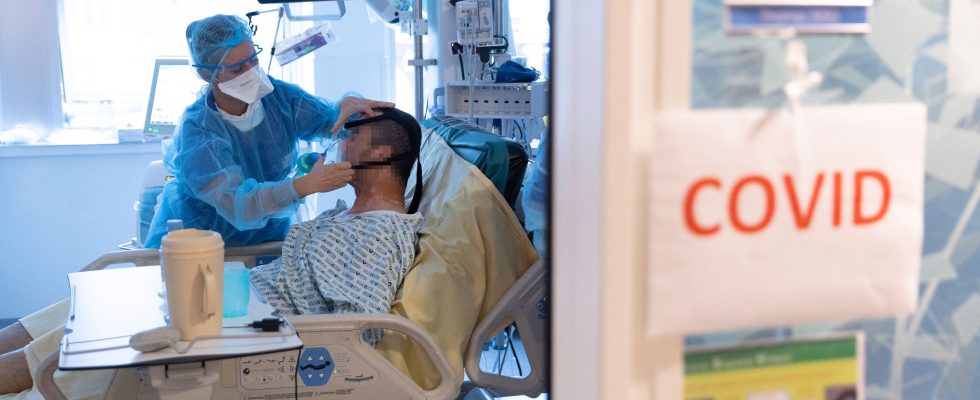Head of the medical intensive care unit at Saint-Louis hospital (AP-HP) in Paris and president of the European Society of Intensive Medicine, Professor Elie Azoulay represents more than 10,000 of his colleagues, all over the Old Continent. and even beyond. He calls for taking advantage of the June 9 elections to put at the heart of European discussions the reforms essential for better preparation for a next pandemic. With one conviction: greater coordination between the Twenty-Seven is an essential prerequisite. Interview.
L’Express: The learned society that you represent is very active at the European level. For what reasons ?
Professor Elie Azoulay: During the pandemic, we developed a project with the European Parliament to train caregivers from other disciplines in intensive care and resuscitation, so that they could very quickly make themselves available to come and help the resuscitators. Several thousand caregivers have been trained. On this occasion, an interest group was also created within Parliament, the European parliament intensive care interest group. With the support of MEPs from different countries, we were able to sign two manifestos, the first last July on the mental health of caregivers, and the second in April around 10 health priorities.
One of the objectives is to strengthen the resources dedicated to intensive medicine, based on facts. It is well documented today that every time we increase the number of patients in the care of a nurse, we prevent her from doing her job well, we increase the risk that she will suffer from burnout. out and we reduce the chances for patients to receive the best care. Research has shown that when we go from three to four patients per nurse, the patient mortality rate is multiplied by 1.4.
Beyond the question of means, are there other emergencies?
The specialty “Intensive medicine” still does not benefit from recognition at European level. This was very detrimental during the health crisis, because caregivers could not move from one country to another to help their colleagues. Even when the crisis was particularly violent in Alsace, for example, German doctors could not cross the border to support French hospitals. This is a point that needs to be improved. We saw this clearly during the pandemic: the crisis started in Lombardy, then the virus affected the countries differently.
There would therefore have been an interest in having European coordination, so that caregivers, but also medicines and machines, could circulate according to needs. But until the arrival of vaccines, Europe did not exist. Since then, nothing has progressed on all these issues. And unfortunately, health has completely disappeared from the debates as part of this campaign for the European elections. If a new pandemic arises tomorrow, we would like all the lessons from Covid to be learned, including on the mental health of caregivers. Because we can clearly see today that a certain number of colleagues are leaving their posts, and that it is increasingly difficult to keep beds open.
In the event of a new crisis, would France be better armed today?
Absolutely not. When the virus arrived in our country, we held on by reorganizing the intensive care units. Many treatments were canceled or postponed, and patients are still paying the price today, in terms of undiagnosed illnesses or too late treatment. If a new pandemic were to break out, it would probably be the same thing only worse, because since the end of the health crisis, many intensive care beds have been closed due to lack of staff.
Hospitals, particularly in Paris, are making efforts to recruit, but it is not enough. As for the supply of medicines, which had already been very tight, it would probably be even more delicate. Tensions are only growing, many molecules are already out of stock today.
Do you have any ideas for maintaining a certain degree of preparation despite everything?
We are working on a form of reserve of competent intensive care caregivers, whatever their original discipline. It is a project supported by our European Company, through the training that we continue to offer. This approach is supported by the World Health Organization and the EU, but unfortunately not by the Member States themselves. We are also developing research programs at European level to improve the organization of care in the event of a crisis. For example, we have a call for projects on rationalizing the use of oxygen – which we were close to running out of during the pandemic – by working on the right doses to administer.
Has there nevertheless been progress on certain subjects?
We have made a lot of progress on the role of the families of patients hospitalized in intensive care. This is a crucial issue, because in our services, by definition, patients are asleep and we need to interact with their loved ones to get to know them better. Families are experiencing real trauma, and they need to be supported. In my department, we were already aware of these issues, and during Covid, families were always welcome, even when the official recommendations did not go in this direction. But medicine has always advanced thanks to transgressions! And since then, we have obtained funding of 30 million euros to carry out research with a view to better helping families, learning to communicate with them and finding solutions to prevent post-traumatic stress to which some may be victims.
.
